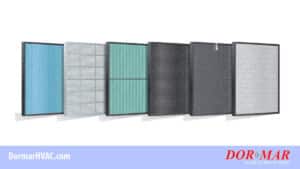Most people, when faced with the decision of being cool and comfortable during the extreme heat of Ohio summers, could care less whether they have a heat pump or an air conditioner. Most of us only care that our family is cool and comfortable. When it’s time to replace your home’s cooling equipment, it’s nice to know what options are available, and what’s best for your home.
Many homeowners may be confused when they try to figure the differences between the two devices, air conditioner or heat pump? This article should give you some solid clues to make the choice.
In part 2, we’ll review air conditioner systems and then compare the two.
Read part 1 of this series here.
What is Central Air Conditioning?
Air conditioners work very similar in fashion to a heat pump, removing heat from inside the home and pushing it outside. The primary difference is that a central air conditioning unit does one thing very well, it cools your home.
How Does an Air Conditioner Perform Its Magic?
A central air conditioner is a split unit that contains the following components:
- An outside unit, containing a condenser and compressor
- Evaporator coil inside the home (also frequently called an “a-coil” because of its shape)
- Refrigeration lines, tubing that connects the two units
- Coolant / refrigerant that circulates throughout the indoor and outdoor units
- Fans that distribute the air through the home’s ductwork
- A control panel (thermostat) that allows the homeowner to manage the temperature
Air conditioners rely on the refrigerant in the system to perform the magic of absorbing heat from inside the home and releasing it outside. Air conditioners do exactly as their name suggests: dehumidify and condition the air inside the home. Any water vapor, AKA humidity, in the air makes it difficult for our bodies to regulate its temperature. When the mercury rises, our bodies feel overheated, but air conditioners remove humidity from the air and makes our skin surface feel cooler.
Advantages and Disadvantages of Air Conditioning
Large homes with existing ductwork are the perfect environment to install central air conditioning. In a Central AC system, cooling processes and fans circulate the air throughout the home using a system of ducts that keep your family cool and comfortable.
Benefits of Air Conditioning
In today’s modern world, we don’t have to spell out exactly what air conditioning does. But from a technical perspective, air conditioners are a specialized piece of equipment with a single task: remove warm, humid air from the inside and move it outside. And modern air conditioners perform that task very, very well. They can produce just the right amount of cooled air and circulate it through your home. Central air conditioning systems also improve indoor air quality by filtering the air and reducing allergens.
Disadvantages of Air Conditioning
One of the biggest “issues” with air conditioners is they cannot create heat, requiring another piece of equipment for that task. If the outside air temperature drops below about 55 degrees in the winter, heat is a necessity. That means an AC system must be matched with a furnace to provide winter temperature control, requiring a higher price tag.
Decide Between AC and Heat Pump
As we’ve examined in this series, there are a lot of similarities between heat pumps and central air conditioners. Both units use existing ductwork in a home, and both are powered by electricity. When in cooling mode, both air conditioners and heat pumps cool the home by extracting heat and humidity from the inside and moving it outside.
What are the deciding factors between a central air conditioning unit or a heat pump?
Factor Number 1: Purchase and Installation Cost
Each homeowner’s situation is going to be unique, but the major factor in deciding between the two types of systems is the cost to purchase and install the system. AC systems can vary in price between $4,900 and $13,000 in the Newark, Ohio area, with a heat pump cost about 10-15% more than that.
Factor Number 2: Operating Costs and Energy Efficiency
Air conditioning systems and heat pumps are rated by their Season energy Efficiency Ratio (SEER). SEER measures the cooling output of a cooling system during a typical cooling system. Heat pumps are also measured by their Heating Seasonal Performance Factor (HSPF). With either measurement, you can get high performance results.
If you are constantly changing temperatures in your home, or it has a lot of southern exposure windows, you’re doing to see lower efficiency, no matter the SEER rating. During the cooling season, air conditioners and heat pumps with similar SEER ratings and going to cost about the same to operate. During mild winters, however, a heat pump is going to be more efficient, with lower heating costs, than a gas fired furnace. If the temperature drops below 30 degrees on a regular basis, that energy savings advantage is lost.
Factor Number 3: Equipment Life Expectancy
Since heat pumps work year round (as mentioned in part 1), potentially reducing their life expectancy. On the other hand, and AC system only needs to work when the outside temperatures are warm. They get a break in the winter when the furnace is doing the heavy lifting. A heat pump’s shorter life span could be offset by lower operating costs during mild winters.
Heat pumps work really well at temperatures over freezing, only needing just enough energy to maintain warm temperatures in the home. Regular annual tune-ups for either type of system will extend the longevity and keep them running at maximum efficiency.
The Bottom Line
The bottom line is that heat pumps are more popular in more temperate sections of the country like the south. And the tried-and-true combination of air conditioner and furnace are usually the right choice for central Ohio. Heat pumps, however, are making gains as manufacturers are starting to improve their ability to heat at lower temperatures… but we’re just not quite there yet.
The answer to the question posed in the title is that traditional air conditioning and furnaces are just about right for the Ohio seasons, unless we see milder winters each year.
If you’re in the market for a new system, it’s worthwhile to have a professional evaluation of your current system and ask our estimator if he thinks heat pumps might be a good fit for your home.
Reading part one of this series
Dor-Mar to the Rescue!
Schedule an appointment for HVAC system installation, troubleshooting or maintenance with us today by using our online contact form, or call one of our seven neighborhood offices listed below. We pride ourselves on our customer-focused service, and our reviews show it.
NEWARK 740.345.6639 • COLUMBUS 614.238.6689 • DUBLIN 614.545.8939 • REYNOLDSBURG 614.365.1579 • WESTERVILLE 614.381.1540 • GROVE CITY 614.595.3098 • ZANESVILLE 740.454.2420
Dor-Mar…Your Climate Hero!







